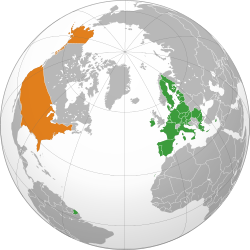Euro-American relations
 |
|
|
European Union |
United States |
|---|---|
Relations between the United States of America and the European Union are the bilateral relations between the country and the supranational organization.
The EU and US are the biggest economic and military powers in the world, despite the lack of a common EU defense policy. They dominate global trade, they play the leading roles in international political relations, and what one says matters a great deal not only to the other, but to much of the rest of the world. And yet they have regularly disagreed with each other on a wide range of specific issues, as well as having often quite different political, economic, and social agendas. Due to the European Union not having a fully integrated foreign policy, relations could be more complicated where the EU did not have a common agreed position e.g. EU foreign policy was divided during the Iraq War. Understanding the relationship today means reviewing developments that predate the creation of the European Economic Community (precursor to today's European Union).
Euro-American relations are primarily concerned with trade policy. The EU is a near-fully unified trade bloc and this, together with competition policy, are the primary matters of substance currently between the EU and the USA. The two together represent 60% of global GDP, 33% of world trade in goods and 42% of world trade in services. The growth of the EU's economic power has led to a number of trade conflicts between the two powers; although both are dependent upon the other's economic market and disputes affect only 2% of trade. See below for details of trade flows;
In 2007, a Transatlantic Economic Council was established to direct economic cooperation between the two. It is headed by the US. Deputy National Security Advisor for International Economic Affairs and the EU's Commissioner for Trade. However, it is yet to produce solid results. A Transatlantic Free Trade Area had been proposed in the 1990s and later in 2006 by German Chancellor Angela Merkel in reaction to the collapse of the Doha round of trade talks. However, protectionism on both sides may be a barrier to any future agreement.
...
Wikipedia
